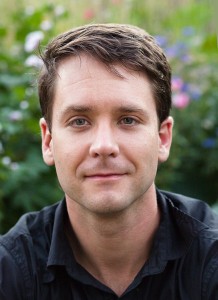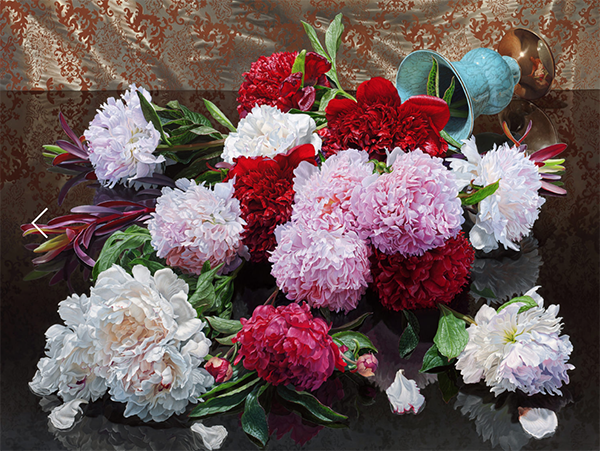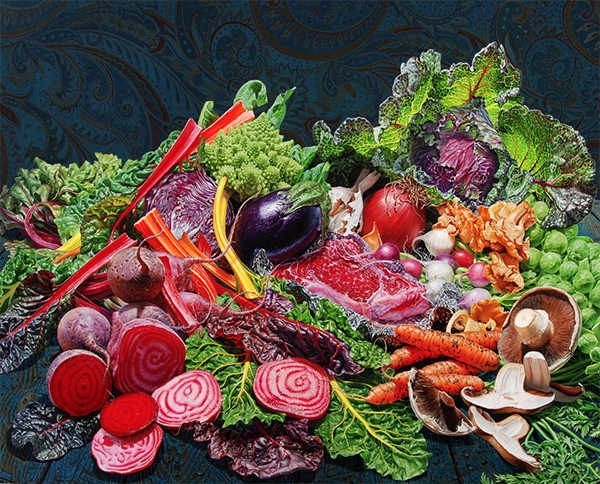A few hours after I interviewed artist Eric Wert, he emailed this to me:
“Since we spoke, I’ve been hit with anxiety in a way that I haven’t felt for quite a while. I think I realized that one of the ways the I deal with anxiety is just to stay too busy to think about it! I enjoyed our interview, but think I may have come across as having conquered anxiety, so I just wanted to underscore that, even now 15 years into my career, staying focused and positive is an everyday struggle.”
Then, the next day, another reply:
“I was feeling really low yesterday – you caught me at a point where I hadn’t had any sales for quite a while, which can really make you question the value of doing something as difficult as making art. Today, I just had a major sale and am back in the safe zone financially for a good while. In one day, the stress went from not being able to make ends meet to not having enough work to meet demand! Funny how that goes.”
 This exchange perfectly encapsulates the everyday reality of the successful creative professional. The one who has created an established career, has received accolades, whose work sells for five figures, and who is well into working on their art full time.
This exchange perfectly encapsulates the everyday reality of the successful creative professional. The one who has created an established career, has received accolades, whose work sells for five figures, and who is well into working on their art full time.
Every day is still a battle with anxiety.
I am so excited t share this interview with artist Eric Wert. You can find Eric on Facebook, Ello, and Twitter.
His most recent show opens in November at William Baczek Fine Arts in Northampton, MA. Here is a sampling of some recent work:



Key insights from my chat with Eric are below, and you can listen to the full conversation here:
Here are some key quotes from Eric that blew me away:
“Well, we’ll make it a reality.”
Eric’s parents were incredibly supportive of his art, and this underscores how important it is to have support from others. When deciding on colleges, this was the conversation with his mother:
His mom: ”I think you probably really want to go to art school.”
Eric: “Well yeah, but I don’t think that’s a reality.”
His mom: ”Well, we’ll make it a reality.”
“I taught evenings and weekends and that was how I made my living.”
For years Eric had to find ways to make ends meet as his art career became established. You have to give your creative dreams enough runway to take off: “I started teaching right away at community colleges and various schools around Chicago and so that was really how I supported myself for the first seven or eight years. I taught evenings and weekends and that was how I made my living.”
“You were lucky you got a rejection letter.”
Getting his work seen took a serious investment in time, money, and pure gumption. To get his work shown in galleries, he said this: “I put together a body of work, a series of drawings and I just sent them to every gallery I could think of that would show that kind of work. At the beginning of my career that was really how I got all of my opportunities is every time I would see a gallery anywhere in the country that looked like it would exhibit the kind of work that I do, I would just send them a packet of slides and material. So it was sort of the shotgun method. And I got in the habit of maybe every six months or so just sending out material to 25 or 30 galleries and if you were lucky you got a rejection letter, but maybe once a year or so I’d get a group show out of that or occasionally a gallery would pick me up. And it was just a matter of timing. They would say, “Oh, we’re having an exhibit of drawings right now and this would be perfect for it.” And so it was a matter of being seen at the right moment. Now this was back before everything was digital so it was a matter of sending a sheet of slides. So it was kind of an expense to do that much promotion.”
“Take yourself seriously from the very beginning”
Eric’s advice to young artists: “The one piece of advice that I always give to young artists is take yourself seriously from the very beginning. Hire a professional photographer, make sure you have a well designed website. Even if you’re not that confident about your work, present it in the most confident way possible. And having that experience of presenting yourself as a competent professional, that’s what people will take seriously. I think it’s easy to think that you’re not ready yet, but the truth is you’ll never be ready. You always have another level to get to, right? So even now I think, “Oh, I’m not at the place I want to be.” So when you’re a young artist you think, “Well, maybe in a year I’ll have a more developed portfolio. Or maybe two years from now I’ll be ready to show with that gallery that I love.” But the people who get the opportunities are the ones who put themselves out there.”
“If you’re rejected 90% of the time, you’re actually incredibly successful.”
On dealing with rejection: ”You just go for it and don’t be disappointed by rejection. If you’re rejected 90% of the time, that means you’re getting 10% of the things you apply for and you’re actually incredibly successful.”
“Managing anxiety is the… biggest challenge.”
The biggest distraction in his life: “Managing anxiety is the main issue in our lives, that’s the biggest challenge. The uncertainty around the income and around what the future is going to be, that’s the biggest distraction and that can sometimes be the hardest thing to overcome when you’re working in the studio.”
“Exercise… has changed my ability to focus and concentrate.”
On the value of having habits to manage physical and mental health: “Anxiety was a big issue for me. Especially a few years ago around the recession. I was just terrified and I found that it wasn’t just the realistic anxiety, it was the having anxiety attacks and the distraction involved with that was cutting into my work. I couldn’t concentrate the way I needed to so I started running and went on from there. Now I exercise about an hour a day and I’m religious about that because it really has changed my ability to focus and concentrate on the issue at hand. When you have anxiety, even if there’s nothing you can do about it, you still just sit there and worry about things. And I find that if I just exercise, whatever that does, whatever change that makes in your brain, I can put my concerns aside while I’m working and just do what needs to be done. You know, exercise evangelists are always annoying but I think I’ve become one.”
“I go right to the studio by 8:30 or 9 and I work pretty much straight through until 4 or 5 in the afternoon.”
On putting in the hours with his craft: “I get up probably 8 o’clock, I go right to the studio by 8:30 or 9 and I work pretty much straight through until 4 or 5 in the afternoon. Then I exercise and make dinner, and then I get back into the studio probably around 7 or 8 and work until midnight. I do that five days a week and then I work a little bit on the weekends, too.”
“Every time I sell a painting part of me says, “That’s the last painting you’re ever going to sell.”
How even at mid-career, success always feels like something that you have to fight for, “I’ve sold a lot of work but every time I sell a painting part of me says, “That’s the last painting you’re ever going to sell.” That’s maybe a depressing way to think about it, but it also keeps me motivated in the studio. That the next thing I do has got to be really good because I’ve got to prove myself again.”
“With my career it’s feast or famine.”
How oftentimes, success in creative work is a process of falling forward, not a grand plan that allows you to feel safe and comfortable, “With my career it’s feast or famine. I never just had steady sales where I just finish a painting and it sells and I get a regular paycheck. Often I’ll have a show every two years and those will do very well and I’ll get a large amount of money from that commission. But then that might have to last me for another year before there’s another sale or another . . . who knows how long? So there’s that uncertainty in terms of planning how you’re going to manage your life. You get a big check and you think, “Well I’m going to buy all the stuff that I need for the house, new furniture and what not.” Then you have to think, “Well yeah, but who knows how long this is going to last?” So even when you’re flush you have to live like you’re not. It’s taken care of itself for the last 15 years. And it’s gotten very close to the bone. There’s been plenty of times where I think, “Well, I think I’m gonna have to figure something else out.” And then some miraculous sale comes through and I get to keep going for a little bit longer. I wish I could make it sound more like it’s all part of some grand plan, but I’ve really just been kind of limping along and it’s been working so far.”
You can read the full transcript here.
Thank you to Eric for your incredible generosity in making time for me, and for sharing so openly. For more interviews in this series, please click here.
-Dan
Podcast: Play in new window | Download
Subscribe: RSS
